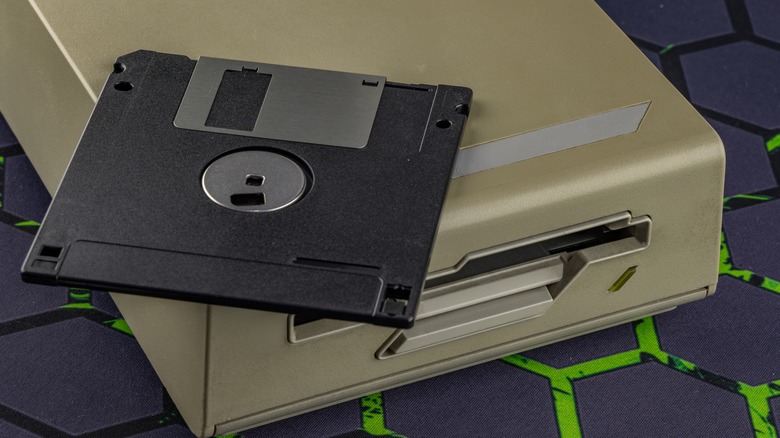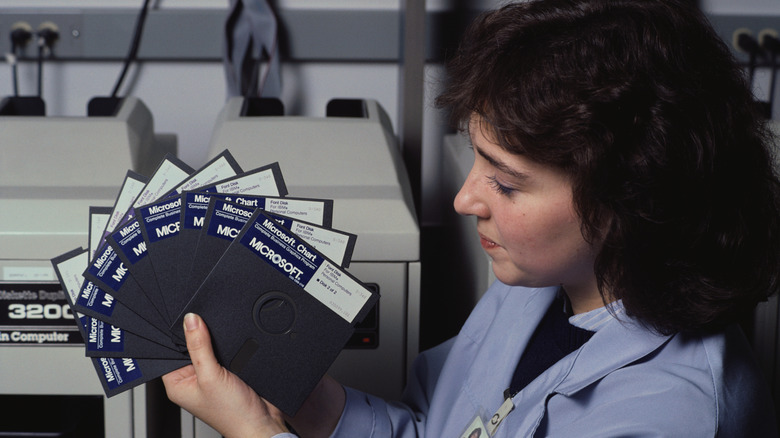Why The FAA Still Uses Floppy Disks To Manage Your Flight
What do floppy disks and the cancellation or delay of over a hundred flights at the Newark airport have in common? Well, in an age where we are talking about quantum computing and light-based data transfer, one of the busiest international airports in the world continues to rely on the aging storage format. According to the U.S. Transportation Secretary Sean Duffy, the systems currently in use to manage air traffic are incredibly old and still reliant on floppy disks.
"Our system is 25-30 years old. We use copper wires. Floppy disks," Duffy told a panel. "It's atrocious, the system we use. It's safe, but we're seeing the cracks of age." This won't be the first time he has raised an alarm about the antiquated systems. Just over two months ago, in the aftermath of multiple plane crashes, Duffy targeted the Federal Aviation Administration's crumbling tech infrastructure. Back then, he highlighted floppy disks as one of the core examples of an outdated tech stack.
We're seeing the cracks of age in our air traffic control system. That's why we're going to go from copper wires to fiber, add new terminals for controllers, and give them sensors on runways to see better.@USDOT is working with the best to get this revamp done in record time to... pic.twitter.com/Hu9tk7DdQU
— Secretary Sean Duffy (@SecDuffy) March 19, 2025
Last year, Airlines 4 America (A4A) also lambasted the sore lack of technical upgrades within the Air Traffic Control (ATC) and Air Traffic Organization (ATO) systems. A4A chief Nick Calio mentioned that the usage of floppy disks blows his mind. Tom Perksy, who runs a floppy disk business, revealed that airlines are the biggest customers for the aging storage standard. Duffy also highlighted that the lack of funding is what has blocked the system upgrades, and that the administration wants to finally get it done.
But why floppy disks?
Air traffic control systems currently in use by the FAA rely on a system called IDS (Information Display System). "This is the equivalent to a pilot's flight bag. It has all the information a controller relies on to run operations," Calio explained in a lengthy remark about the laggard status of the FAA's tech stack. The whole infrastructure was conceived in the 1990s and relied on floppy disks. Microsoft has since kicked the entire software stack out of its support channel, but the aging system is still used widely for uploading data written on floppy disks.
As of 2024, the floppy-driven system was in use across 200 air traffic systems across the country. Interestingly, the system has attracted scrutiny not just from industry watchers, but also from government-backed agencies and politicians. Yet, it's not just the lack of funding, but also poor spending. According to Forbes, an astounding 92% of the FAA's Facilities & Equipment budget is burned in maintaining its antiquated systems.
In a lengthy safety review published by the National Airspace System (NAS), a lack of funding is behind the poor status of the operational tech stack, and it was nothing short of a ticking time bomb from a safety perspective. "If unaddressed, the ATO will be unable to maintain current capacity, let alone expand and modernize the system. The understaffing that currently exists within the ATO places additional strain on the system, further eroding the margin of safety and increasing risk," the NAS wrote in its 2023 analysis and recommendation report.
One problem, repeated warnings
Interestingly, floppy disks have been deemed problematic as far back as three decades ago. In 1995, the FAA's Office of Aviation Medicine submitted an 82-page field study report (PDF) following an analysis of the aviation safety systems. Under a section titled "Problem," the report cited inspectors complaining about having to handle too many peripherals, including floppy disks.
"Inspectors were afraid they would either lose some of these peripherals or they would not have them when needed," the report said. In March this year, the United States Government Accountability Office also highlighted the utter state of systemic aviation system shortcomings. The agency made it clear that the FAA's reliance on old and potentially unreliable air traffic control (ATC) systems jeopardizes its ability to maintain safe, efficient air travel.
Interestingly, it's not just ground-based systems that still rely on floppy disks, but also planes, such as the Boeing 747. As part of their DEF CON presentation, experts from Pen Test Partners revealed how an element as critical as the navigation database loader was still reliant on floppy disks. In order to update the database, a certified professional has to manually swap them with fresh floppy disks.
But compared to the FAA's systems, the usage of floppy disks in the 21st century is mostly limited to legacy aviation systems and not modern age commercial jets. There are some concerns about the safety aspect, as floppy disks are said to be more resilient compared to a modern-age system reliant on USB-based storage interfaces.


